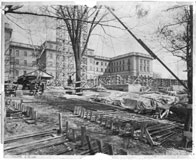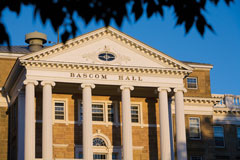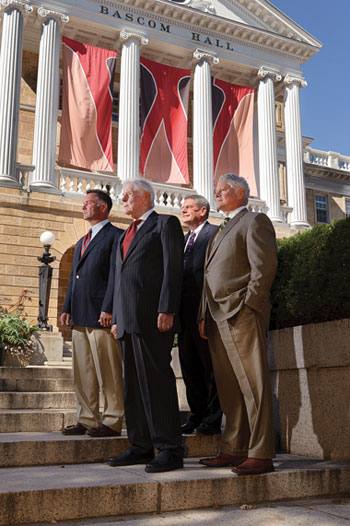
From left, Richard, J.P., Mark and David Cullen stand before Bascom Hall, to which the firm that would become J.P. Cullen & Sons, Inc. built an addition in the 1920s.
When the firm that would become J.P. Cullen & Sons, Inc. was working on an addition to Bascom Hall in the 1920s, it encountered a dilemma.
The company hired to quarry the sandstone became insolvent, providing a major challenge. Undeterred, the Cullen company hired its own stonecutters and completed the addition to the University of Wisconsin-Madison’s signature structure in time for a 1927 dedication.
“We’re used to solving problems,” said Mark Cullen, chairman of the firm, based in Janesville, Wisconsin. “We’ve heard about how challenging that was at the time, but the company was able to go forward and get the job done for the University of Wisconsin.” In addition to Mark, Cullen family leaders at the firm are brothers David, president and chief executive officer, and Richard, vice president of field operations. The three assumed the leadership mantle from their father, J.P. Cullen, who retired as president in the 1980s but still comes in to work on most days.
From those early years working on Bascom Hall in the 20th century through the opening of a remodeled and expanded School of Education building and breaking ground on a new School of Human Ecology building in fall 2010, J.P. Cullen & Sons, Inc. has consistently come through for the University.
In addition to its many building projects – from Sterling Hall to the remaking of Camp Randall Stadium, from 1960s dormitories to the futuristic Engineering Centers Building and gleaming Biochemistry Building – the Cullen family, the firm and the Cullen Community Foundation have made gifts supporting many activities on campus.
Through direct family gifts and gifts from the foundation, the Cullens have supported the College of Engineering, Wisconsin School of Business, American Family Children’s Hospital, the School of Medicine and Public Health and many aspects of intercollegiate athletics, including Heritage Hall.
“Since 1999-2000, we’ve provided scholarships to the College of Engineering specifically targeted to students who are going to go into the construction industry, not necessarily with our firm,” Mark Cullen said. “We hope those students will stay in the state and continue to raise the bar for the entire industry.”
Engineering Professor Jeff Russell, chair of the department of civil engineering, notes the way that the Cullen firm has supported students on campus. “They have made an impact giving students opportunities to learn about the construction process. They have annually provided scholarship funding for our students, hired students to work as co-op students, summer interns and part-time during the academic year on campus projects, and they have created a one-credit class around an ongoing project for more than seven semesters,” Russell said. “The class can be viewed as a field practicum. They also have hired a large number of our students full-time.”
Work of generations
The Cullen family has had many members who have built parts of the University. Pointing to a photo of old University Hospital, Mark Cullen said, “All four generations of Cullens worked on this building.”
At one time, the Cullen family lived in Madison. When J.P. Cullen was young, the family moved to Janesville.
“Like today, back in the 1920s, the University was an economic engine in our state,” Mark Cullen said. “It required facilities, and it grew to be a significant client for our company.”
J.P. Cullen & Sons has played a part in every recent surge in UW-Madison construction: Post-World War II, with the return of the G.I.s; the 1960s and its new dormitories to house the Baby Boomers; and the ’90s until now, boosted by a growth in the sciences. In that latest period, the Shain Chemistry Tower, the Engineering Centers Building and Biochemistry Building stand as prime examples of the builders’ capabilities.
“When one says ‘sciences,’ I sure would have to include engineering. The work there that the professors and students are doing provides economic stimulus to the state and its economy.”
Mark Cullen
“When one says ‘sciences,’ I sure would have to include engineering. The work there that the professors and students are doing provides economic stimulus to the state and its economy,” Cullen said. “It’s been a privilege for the Cullens, our professional staff and for our trades people to be involved with such forward-thinking facilities.”
Mark Cullen had his own Badger journey as a safety on the 1972-74 teams, and he played alongside featured running back Rufus “The Roadrunner” Ferguson. “I was a recruited football player, and I got to play a fair amount,” he said. He eventually earned his degree from UW-Whitewater.
He went from working on the playing field to the infrastructure during the renovation of Camp Randall. “It was a joint venture with C.D. Smith Construction Inc. from Fond du Lac, a wonderful partner,” he said. “That was one of the most demanding projects we’ve undertaken, along with the restoration of the state Capitol. It spanned three seasons.
“We had to get critical phases done between seasons. Then we had to make it accessible to 80,000 fans every game, every season,” he said. “The minute the game was over, we’d be right back in there late Saturday, Sunday, advancing the construction.”
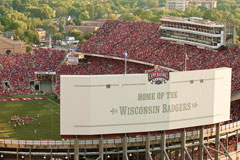
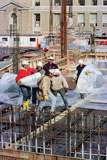
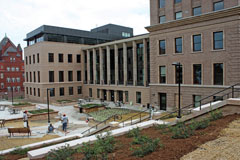
One such crunch involved the end zone seating on the Field House end of the stadium “Our crews came in and demolished the entire existing stands and built new ones before the next season,” he said. “There was pressure there, and with getting the stadium suite project done. We’re very proud of how it turned out.”
Fans streaming into the stadium on football Saturdays see the J.P. Cullen & Sons name on barriers set up along Breese Terrace, but they might not realize all the firm has done on campus, and for the players who take the football field on Saturdays.
“Since I was in school, we have hired a number of players to work for us in the summers,” he said. “Lou Holland and Ken Bowman were among those who worked for J.P. Cullen & Sons.”
Enduring quality
The firm and family are proud of work such as the recently completed School of Education project, funded in large part through a gift from Tashia and John Morgridge. “This was a difficult restoration, and now there’s a big addition on it,” Cullen said of the building on Bascom Hill. “It was a tough job, and I believe the project demanded all our skills. The people who are working in that building are pleased with the end product.”
Collaborating with leading architects on projects at the University has advanced the firm’s capabilities. “For us to be able to work there, to be involved with the finest architects in the state of Wisconsin, some of the finest architects in the United States, drives the whole level of performance in our company,” Mark Cullen said.
Alan Fish, associate vice chancellor for Facilities Planning and Management, spoke to the firm’s work for the University. “The UW-Madison and J.P. Cullen & Sons have grown together for multiple generations,” Fish said. “In the last decade they have built almost $400 million in major projects across campus. Many of them were challenging renovations of historic buildings such as Camp Randall Stadium, Education and Sterling Hall.
“They bring a hard-working team of skilled craftsmen, familiar with the campus, and deliver us long-lasting and functional buildings,” Fish said. “Whenever they are selected for a job we are confident in the result.”

